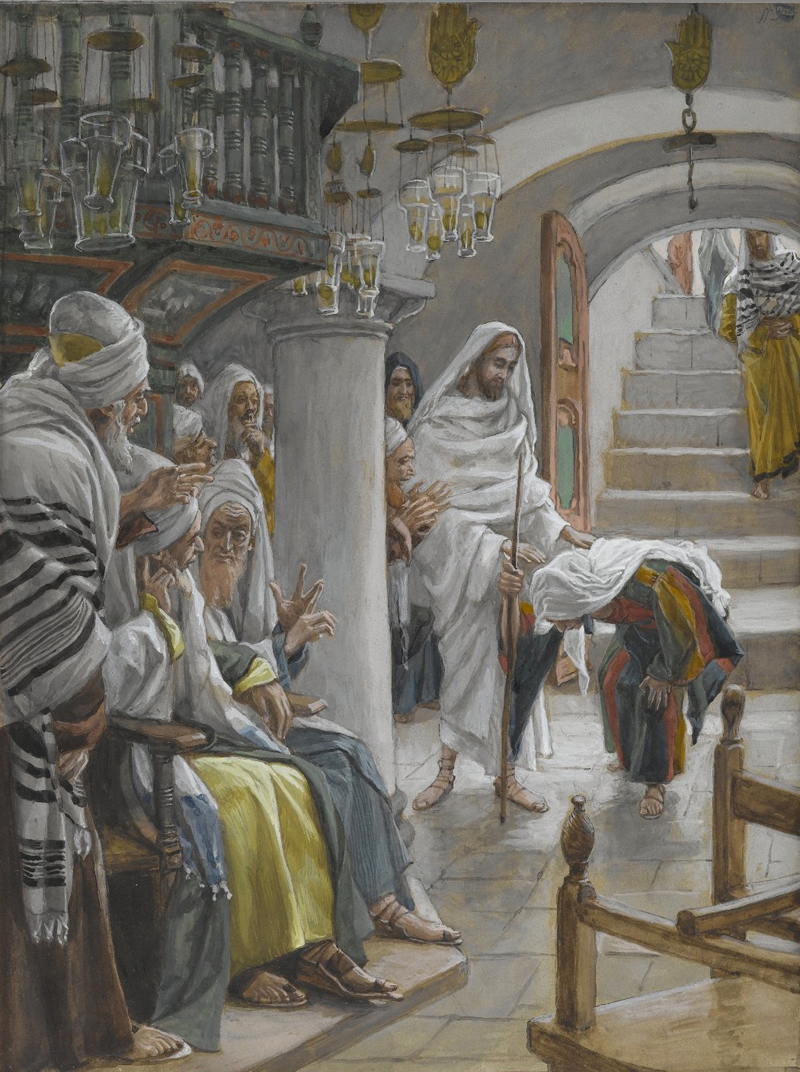
Woman with an Infirmity of Eighteen Years
James Tissot, ~1890
My dear friends,
Today, let us reflect upon Luke 13:10-17, which tells the story of a woman who was set free from her ailment by Jesus, but also highlights a crucial lesson about compassion and understanding. In this teaching, we find wisdom that transcends religious boundaries and speaks to the universal principles of love and compassion.
In this passage, we encounter a woman who had suffered for eighteen long years due to a spirit that had crippled her, rendering her unable to stand up straight. She lived in pain and despair, bent over by the weight of her affliction. Her suffering was not just physical but also emotional and spiritual. She was, in a sense, bound by the chains of her ailment.
Then, Jesus enters the scene. He sees her and, with compassion in his heart, calls her over. He tells her, "Woman, you are set free from your ailment." He extends his healing touch, and in an instant, she stands up straight and begins praising God. This miraculous healing is a testament to the power of love, compassion, and divine grace.
But as the story unfolds, we witness a contrasting response from the leader of the synagogue. He becomes indignant because Jesus had chosen to heal on the Sabbath, a day traditionally reserved for rest and worship. In his zealous adherence to the law, the leader chastises the crowd, saying that healing should occur on the other six days designated for work, not on the sacred Sabbath.
However, Jesus, in his wisdom, responds to this criticism with a powerful question: "You hypocrites! Does not each of you on the Sabbath untie his ox or his donkey from the manger and lead it away to give it water? And ought not this woman, a daughter of Abraham whom Satan bound for eighteen long years, be set free from this bondage on the Sabbath day?"
In this response, Jesus challenges our understanding of the Sabbath and, by extension, our understanding of religion itself. He reminds us that the Sabbath is not meant to be a day of rigid adherence to rules but a day of liberation and compassion. He calls out hypocrisy and invites us to reflect on our actions and intentions. He emphasizes that the essence of any religious practice should be love, kindness, and the alleviation of suffering.
My dear friends, regardless of our religious backgrounds, we can all draw profound lessons from this passage. It reminds us that the essence of spirituality is not found in dogma or ritual but in our capacity to alleviate the suffering of others. It teaches us that compassion should transcend rules and regulations.
In our own lives, let us reflect on how we might sometimes become entangled in the rigidity of our beliefs, missing the opportunity to extend a hand of compassion to those in need. Let us remember that every day can be a day of healing and liberation if we open our hearts to the suffering of others.
Just as Jesus' actions put his opponents to shame and filled the crowd with joy, let us strive to be sources of inspiration and compassion in our communities. May we follow the example of Jesus and embrace the true spirit of love and healing, for it is in such actions that we find the path to inner peace and the betterment of our world.
May peace and compassion guide our lives, always.